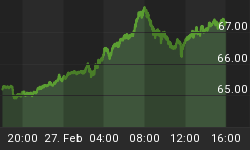We had the good fortune of receiving a manuscript of Conquer the Crash a few weeks ago. I am admittedly an eager promoter of Elliott Wave International and look forward to reading Bob's new books.
Written over the past few months, the book is timely and promises to dispel the many Internet myths that have upstaged Bob's actual market views.
Conquer the Crash is really two books: "Why a stock market crash, monetary deflation and economic depression are likely to occur soon" and "How to protect yourself and profit from deflation and depression".
Fans of At the Crest of the Tidal Wave may want to skip Book One and turn to Book Two right away, but we enjoyed the updated charts and did not want to miss any fresh words of wisdom.
Book One begins with Mr. Prechter skilfully exposing the fallacies of the "New Economy", as he proves that the bull market of 1974 -2000 was merely a shadow of the 1942-1966 bull market; and that the economic benefits in the "New Economy" pale in comparison. Those still listening to the cavalier economists of the mainstream media will find this section bluntly crushes their world views.
"For example, average annual corporate profit growth fell from 10.8 percent in the first fifteen years of the bull market to 9.8 percent in the 1990s, a decline of 20 percent." - page 13 Conquer the Crash
A discussion of when depressions occur leads into an Elliott Wave tutorial evaluating the stock market today. Bob chronicles the dangers of high stock market valuations, as well as optimistic psychology historically.
| "Bob Prechter's new book, Conquer the Crash, provides a wealth of self help do's and don'ts. It's a must-read book which I'm personally putting on my gift list for friends and loved ones." "This is the most crucial financial period in your life. This book explains why. It also tells you what you should do about it. If you want to preserve your wealth, I urge you to follow Prechter's advice. You will be grateful that you did." "A compelling exposition of how both the mechanics and the psychology of the business cycle can be encapsulated in market analysis." |
The last half of Book One makes a strong case for deflation and delves into money, credit, and the Federal Reserve. We find Bob's use of Webster's definition of inflation and deflation proper and simple. Webster says " Inflation is an increase in the volume of money and credit relative to available goods," and "Deflation is a contraction in the volume of money and credit relative to available goods." Readers who eagerly await the CPI and PPI inflation numbers from the Commerce Department monthly would do well to read this part of the book twice.
Bob makes a terrific argument for why deflation is likely today, referencing the immense ever expanding and non-self-liquidating credit around the globe.
"Conventional economists excuse and praise this system under the erroneous belief that expanding money and credit promotes economic growth, which is terribly false. It appears to do so for a while, but in the long run, the swollen mass of debt collapses of its own weight, which results in deflation, and destroys the economy. Only the Austrian school understands this fact. A devastated economy, moreover, encourages radical politics, which is even worse." - page 105 Conquer the Crash
Book Two is about making preparations and taking action.
"…is designed as a guide for arranging your finances prior to any future deflationary depression, whether one occurs now, as I expect, or not." - page 142 Conquer the Crash
All asset classes are discussed; including bonds, real estate, collectibles, cash, commodities, precious metals and stocks. Various kinds of investment products are also discussed; pension plans, insurance and annuities for instance. Bob provides specific directions on where to go and what to do to get good advice.
The duration and size of the coming deflation/depression, while unknown, has ramifications well beyond our financial decisions. There are lengthy discussions on "Imperative Do's and Crucial Don'ts", "Should you rely on the Government to protect you", employment, debt, and your business. We especially liked the section on safe banking in the United States, which includes references to Weiss Ratings, Inc. research.
Only two pages long and in point form, the final chapter "What to do at the bottom of a deflationary crash and depression', should be photocopied and kept handy.
"Choose your location well and remain watchful of world affairs, because wars often break out during or shortly after depressions." - page 262 Conquer the Crash
Conquer the Crash is a must read.















